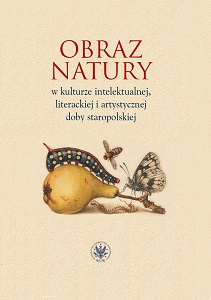Ars agriculturae w staropolskim piśmiennictwie rolniczym
Ars agriculturae in Old Polish Agricultural Literature
Author(s): Maria Wichowa
Subject(s): Cultural history, Studies of Literature, Theory of Literature
Published by: Wydawnictwa Uniwersytetu Warszawskiego
Keywords: ars agricultura; praise of farm work in Old Polish literature; man’s symbiosis with nature; improvement of nature’s creations; locus amoenus; Cicero; Varro; ars bene vivendi; ethos of a landowner
Summary/Abstract: The creators of Old Polish utilitarian agricultural magazines, treaties, guides, encyclopedias, following Cicero and Varro, but primarily using their own knowledge and “expertness”, understood the concept of ars agricultura as gaining experience, improving skills, thoroughly analyzing their knowledge, improving it until reaching the level of mastery and passing it on to people interested in practicing this art, improving their professional skills. They showed that the country is the locus amoenus, that working on the land is a form of man’s symbiosis with nature, a source of pleasure and health, which ennobles man. They made readers aware that knowledge must go hand in hand with experience, and then the good host – ars bene vivendi is reached. Masteringars agricultura, achieving a high degree of initiation into the arc of this art gives enormous joy of performing it and satisfaction with its results. Ars agricultura is improving, perfecting nature, ennobling it. A farmer – a landowner is a rationalist and pragmatist cultivating the cult of work on the land, which achieves the rank of art. Animal husbandry is also ars involving the gathering and practical application of vast knowledge of both domestic and wild animals. Animal husbandry is also a skill that requires high qualifications of a farmer, knowledge of the nature of the animal, its nutritional and health needs, knowledge about the prevention of animal diseases and their treatment. Establishing and running zoos is also ars. A detailed program of nature protection, respect for the laws of nature and living in accordance with their commands, should be a planned, rational and long-term imperative for noble people responsible for the effects of their activities. Often, however, man turns out to be cruel to animals, but Old Polish literature also has texts expressing sympathy for representatives of the forest fauna. An important issue raised in the analyzed texts is ecology on the landowner’s farm. The topic of farmer’s work ethos is also discussed, in which virtue and reason are to be the guides of the landowner.
Book: Obraz natury w kulturze intelektualnej, literackiej i artystycznej doby staropolskiej
- Page Range: 356-389
- Page Count: 34
- Publication Year: 2020
- Language: Polish
- Content File-PDF

